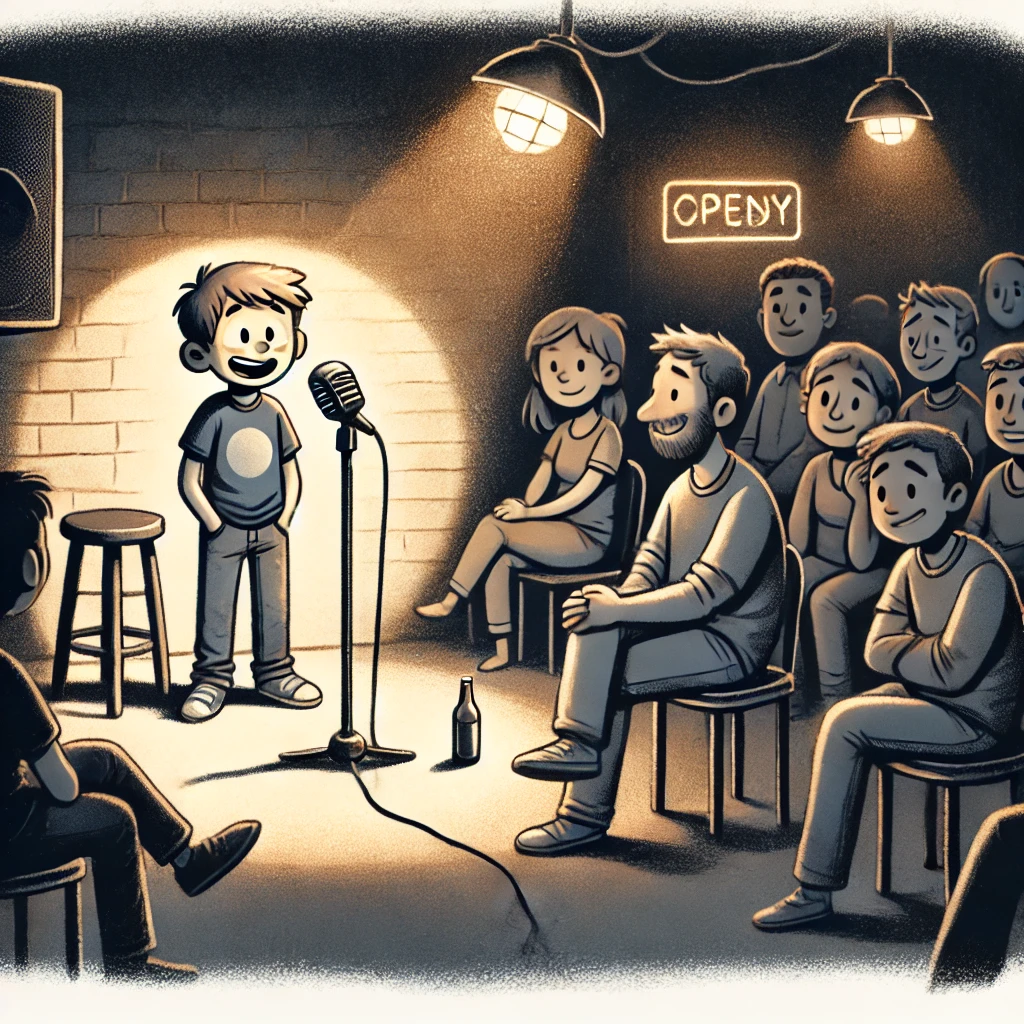Open mics are the proving grounds for aspiring stand-up comedians. They offer a space to test new material, refine your delivery, and gain valuable stage time. However, stepping onto an open mic stage can be both exciting and nerve-wracking, especially for beginners. To help you make the most out of your open mic experience, here are some essential do’s and don’ts recommended by experienced comedians.
Do’s:
- Do Show Up Early and Sign Up:
- Open mics can get crowded, and the earlier you sign up, the better your chances of securing a good spot in the lineup. Arriving early also gives you the opportunity to get a feel for the room, watch other performers, and engage with fellow comedians.
- Do Have a Plan for Your Set:
- Prepare your material ahead of time and know the order of your jokes. Practice your set to ensure it fits within the time limit, usually 3-5 minutes. Rehearsing helps you deliver confidently and stay within the allotted time.
- Do Stay and Watch Other Comedians:
- Watching other performers is a learning opportunity. Observe their delivery, timing, and audience interaction. You can learn a lot from seeing what works and what doesn’t. Plus, staying for others shows respect and supports the comedy community.
- Do Experiment with New Material:
- Open mics are the perfect place to try out new jokes and gauge audience reactions. Don’t be afraid to take risks with your material. If a joke doesn’t land, take it as feedback and refine it for the next time.
- Do Engage with the Audience:
- Eye contact, pauses, and reactions to the audience’s response can enhance your performance. Even in a small crowd, audience engagement can make your set feel more dynamic and interactive.
- Do Record Your Set:
- Recording your performance allows you to review it later. Listen to what jokes worked, where you lost the audience, and how your timing and delivery came across. It’s a valuable tool for self-improvement.
- Do Embrace the Bombs:
- Every comedian has bombed on stage—it’s part of the process. Use these moments to learn and grow. Analyze why a joke didn’t work and adjust accordingly. Resilience is key in comedy.
- Do Network with Other Comedians:
- Open mics are not just about performing; they’re also about building connections. Chat with other comedians, share experiences, and get advice. Networking can lead to future opportunities and support within the comedy scene.
- Do Be Respectful of Time Limits:
- Time limits are there for a reason. Respect them to ensure everyone gets their chance on stage. Overstepping your time can be seen as unprofessional and inconsiderate to the other performers.
- Do Keep Going Back:
- Consistency is crucial in stand-up comedy. Regularly attending open mics helps you build confidence, refine your material, and develop a stage presence. The more you perform, the more comfortable and skilled you’ll become.
Don’ts:
- Don’t Wing It Without Preparation:
- While some comedians thrive on improvisation, going up without a plan can lead to a disjointed set. Have at least a rough outline of your material, so you don’t waste the opportunity.
- Don’t Take Audience Reactions Personally:
- Not every audience will be responsive, and that’s okay. The purpose of an open mic is to learn, not to get immediate validation. Focus on your performance rather than the crowd’s reaction.
- Don’t Steal Material:
- Originality is the cornerstone of stand-up comedy. Avoid the temptation to borrow jokes from others. Your unique voice and perspective are what will ultimately set you apart.
- Don’t Overwhelm the Audience with Offensive Material:
- Pushing boundaries is part of comedy, but be mindful of the line between edgy and offensive. Gauge your audience and adjust your material if necessary to avoid alienating them.
- Don’t Apologize for Bombing:
- If a joke doesn’t work, move on gracefully. Apologizing on stage can undermine your confidence and make the audience uncomfortable. Own your set, good or bad, and keep going.
- Don’t Get Distracted by Hecklers:
- Hecklers are a reality of live performances. Handle them with composure—engage if you’re comfortable, but don’t let them derail your set. Often, ignoring them is the best strategy.
- Don’t Compare Yourself to Others:
- Every comedian has their own pace and style. Comparing yourself to seasoned performers can be discouraging. Focus on your growth and the progress you’re making.
- Don’t Rush Through Your Material:
- Nervousness often leads to rushing, which can cause jokes to fall flat. Take your time, pause for laughs, and allow your punchlines to breathe.
- Don’t Be Discouraged by Silence:
- Silence isn’t always a bad sign. Sometimes audiences are listening intently, even if they’re not laughing out loud. Use the silence as a cue to adjust your pacing or delivery.
- Don’t Give Up Too Soon:
- Stand-up comedy is a marathon, not a sprint. It takes time to find your voice and hone your craft. Keep showing up, keep writing, and keep performing. Persistence is the key to success.
References:
- “The Comedy Bible” by Judy Carter – Provides practical advice for aspiring comedians, including tips on how to succeed at open mics.
- “Born Standing Up” by Steve Martin – Offers insights into the journey of a comedian, including the challenges of early performances.
- Interviews and articles from experienced comedians like Jerry Seinfeld and Dave Chappelle, who emphasize the importance of practice and resilience in stand-up comedy.
Open mics are an invaluable resource for anyone looking to break into stand-up comedy. By embracing the opportunities they offer and learning from each performance, you can develop your skills, build confidence, and make your mark in the comedy world. Remember, every great comedian started where you are now—with a desire to make people laugh and the courage to step on stage. So go out there, take risks, and most importantly, have fun!
Follow me on IG@AliMehediOfficial
